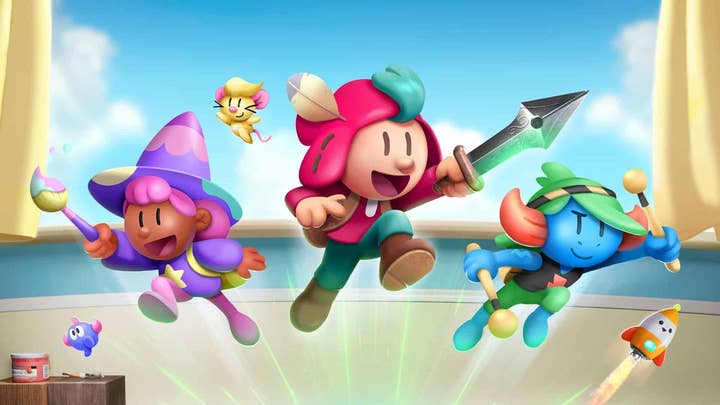Keeping Devolver’s spirit through challenging times
COO Graeme Struthers on regaining momentum, "doing really well in a market that's gone pretty soft," and why the indie label went down the IPO road
After the highs experienced across the industry since 2020, the landing has felt brutal this year.
Games companies across the board are shrinking, laying off staff, closing down. While the market itself remains healthy, with game sales rising, it certainly feels like a tough year.
Even established indie companies couldn't escape the challenges of the hour, with Devolver Digital's stock price plummeting throughout the year, and a number of its releases for 2023 moved to next year.
The indie label went public in November 2021, and it's faced a challenging couple of years since.
"We came into the IPO, and at no point do I recall anyone describing the year that we went down that path as some kind of peak," Devolver's COO and co-founder Graeme Struthers tells GamesIndustry.biz. "It's just the world that you're in. Like a lot of companies in the UK, we benefited hugely from Team17 and how they’ve been doing. So, we didn't realise we were coming into [a] world that was at peak. And then, from November into the following year of March, April, and May, we had three of our biggest projects [launch] and they didn't get anywhere near where we thought they would.
"And at the time, it was like, how did we not really understand how seismic Elden Ring was going to be, how much oxygen it was going to take? And that had an impact on us, had an impact on lots of people. So, yes, that was our first experience of disappointment."
"At the time, it was like, how did we not really understand how seismic Elden Ring was going to be, how much oxygen it was going to take?"
2022 actually ended up being a "banner year" for Devolver, Struthers continues, with the commercial and critical successes of Inscryption and Cult of the Lamb, and Loop Hero and Death's Door still performing really well.
"[But] that's not what people would remember of us," Struthers observes. "They'd just remember, 'Weren't you the guys telling us a few months ago…?' And then, as that year unfolded coming into this year, we're just looking – I mean, it's a curious thing to say... The Devolver company and publishing across the company is doing really, really well, but we're doing really well in a market that's gone pretty soft. And it's not the way that we describe things to ourselves.
"It's like, 'We've got this game, this game, this game, this game, this game.' We're focusing on each one. We're doing what we always have done. And to some degree, we've just got to get on with what we've always been good at, which is publishing video games. And we believe everything will drift gradually back. It's not going to suddenly change."
Struthers notes that the appetite for games like Inscryption and Cult of the Lamb is "stronger than ever." And that's a positive as Devolver has got more indie darlings in the pipeline, though a big chunk of its release slate for the year shifted to 2024, including Free Lives' Stick It To The Stickman and Anger Foot, Ahr Ech's Pepper Grinder, and the highly awaited The Plucky Squire from All Possible Futures.
"This is the perennial problem of video games: even when you get down to what you perceive to be the last eight to 12 months of development, you're also getting to the point where you're reaching content complete, and that's when everyone gets their first opportunity to actually [play] start to finish. And you're always at that point where it's like, how much polishing do you have time for to get a coherent game?
"And in the case of The Plucky Squire, we want the game to be as good as it can be. And you just reach a conclusion, which is: we can push to get it out, and that extends into people having to work through their weekends, all of the things that we know about, but it also means that you're compromising.
"You just end up [needing] another three or four months, and that's the decision. It's somewhat of a challenge now, more so because we do face the scrutiny of the outside world, but our position is that game, giving that extra three or four months, means that when it does arrive, it hits its potential, which means it will still be selling three, four, five years from now. So, that's where we ended up, not just with The Plucky Squire."

And that's not to say Devolver's release slate has been empty this year, with Free Lives' Terra Nil landing earlier this year, Galvanic Games' Wizard with a Gun launching just yesterday, Doinksoft's Gunbrella releasing in September, and Croteam's The Talos Principle 2 coming in November. But now 2024 is looking more stacked than ever for the publisher, with other titles in addition to the delayed ones including Gabe Cuzzillo's Baby Steps and Nomada's Neva.
With new indie publishers emerging on a (very) regular basis, we ask Struthers if signing these titles, or simply doing their job as a publisher, is more difficult.
"I don't feel that it is," he answers candidly. "I can imagine it's more challenging for first-parties and for the media. There are more things to talk about. But no, I don't think so."
Struthers says the consolidation trend actually had a greater impact on the company's business.
"In the year before Fall Guys launched – and Fall Guys was by far the biggest thing we'd ever taken on – we started to see developers we had been working with being approached, and in two instances, being acquired," he says.
Fall Guys developer Mediatonic was acquired by Epic in 2021, with the studio impacted by the mass layoffs at Epic last month (it's worth noting that our interview with Struthers took place before the redundancies were announced). Shadow Warrior developer Flying Wild Hog was purchased by Supernova in 2019, and then by Embracer in 2020.
"And on one occasion, [we were told by] the acquirer that we were the Rolodex, because we've worked with them on their first project and it had done really, really well, so it proves the studio can deliver. They were small, highly profitable, and gone."
Then a third studio Devolver was working with was very open about having been approached to be acquired too.
"And our response was, 'That's a really good deal, and not something we can do.' We hadn't ever contemplated that path. I think everyone knows us, we're like, 'Developers own the IP.' We never tried to get sequel rights. We assume if we do a good job, we'll stay together.
"We hadn't really ever discussed the idea of going public, but we understood that we needed to transform our model so that we could respond to this"
"And then, again, as Fall Guys happened, within five minutes we just had the big industry decide that we shouldn't be Fall Guys people, and approach the developer, which they had every right to do. And again, in that period, we saw other developers we were working with being picked up. We were worried that we would lose – ultimately, if people come along and start buying studios, it is going to narrow who you're working with."
Devolver actually did a bit of its own consolidation after the IPO, acquiring Dodge Roll, Nerial and Firefly Studios in 2021, and Doinksoft in 2023.
And the indie publisher itself was approached by three different companies with acquisition in mind. Struthers says this wave of consolidation was actually a key factor in the decision to take the company public.
"We hadn't really ever discussed the idea of going public, but we understood that we needed to transform our model so that we could respond to this," he explains.
The idea of selling the company made him nervous though, Struthers says, as it would not only make Devolver part of another entity, but also tie the developers whose games had been signed to that new parent.
"And I don't know how that plays out," he adds. "And you can look at something that's happening in the market right now, and it doesn't feel fair that those studios are now being cut."
Venture capital was another option explored, but the firm was worried about it often carrying negative connotations so the idea was abandoned too. So despite being what Struthers calls "the most unlikely" route, going public seemed the best way forward for Devolver Digital.
"When that got discussed, I kept looking around the room and thinking, 'We're us!' But then when you looked at it... this is what gives us a chance. Frankly, it gives us the money and the ability to bring studios into the company, and that was a part of the thinking. And that has happened."
Sign up for the GI Daily here to get the biggest news straight to your inbox

